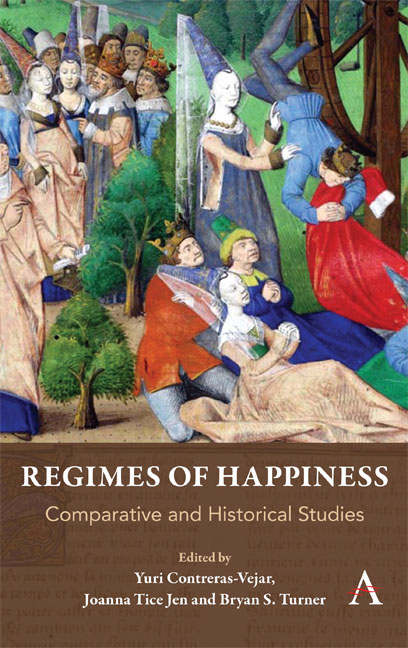Book contents
- Frontmatter
- Contents
- Acknowledgements
- Notes on Contributors
- Introduction: Reflections on Regimes of Happiness
- Part I Happiness in the West
- Chapter One A Fragment of Bliss: Augustinian Beatitudo and the Ideal of Atonement
- Chapter Two Arts of Happiness and Love: Translating Aristotle in the Later Middle Ages
- Chapter Three Spiritual Transcendence as the Path to Happiness in a Selection of Old French Texts
- Chapter Four On Machiavelli, St. Francis and the Pursuit of Happiness
- Chapter Five Their Idea of Happiness Prevents Easy Categorization of Scottish Enlightenment Philosophers
- Chapter Six A Path to Eternal Happiness: Convent Life in the United States in the Nineteenth Century
- Chapter Seven “Be Joyful Always!”: Twenty-First-Century Evangelical Conceptions of Happiness and Trumpist Politics
- Chapter Eight The Erasmus Program: The Promise of European Happiness
- Chapter Nine Innovations in the Psychological Study of Happiness: From Mirror Neurons to Mobile Technology
- Part II Comparative Perspectives
- Index
Chapter Nine - Innovations in the Psychological Study of Happiness: From Mirror Neurons to Mobile Technology
from Part I - Happiness in the West
Published online by Cambridge University Press: 29 May 2019
- Frontmatter
- Contents
- Acknowledgements
- Notes on Contributors
- Introduction: Reflections on Regimes of Happiness
- Part I Happiness in the West
- Chapter One A Fragment of Bliss: Augustinian Beatitudo and the Ideal of Atonement
- Chapter Two Arts of Happiness and Love: Translating Aristotle in the Later Middle Ages
- Chapter Three Spiritual Transcendence as the Path to Happiness in a Selection of Old French Texts
- Chapter Four On Machiavelli, St. Francis and the Pursuit of Happiness
- Chapter Five Their Idea of Happiness Prevents Easy Categorization of Scottish Enlightenment Philosophers
- Chapter Six A Path to Eternal Happiness: Convent Life in the United States in the Nineteenth Century
- Chapter Seven “Be Joyful Always!”: Twenty-First-Century Evangelical Conceptions of Happiness and Trumpist Politics
- Chapter Eight The Erasmus Program: The Promise of European Happiness
- Chapter Nine Innovations in the Psychological Study of Happiness: From Mirror Neurons to Mobile Technology
- Part II Comparative Perspectives
- Index
Summary
Introduction
The concept of happiness can be found across human cultures. Indeed, perhaps the most universal, and pressing, questions throughout human history have centered on the idea of happiness— What is happiness? How do we get it? Is there something beyond or more important than happiness?
From a psychological standpoint, happiness has been studied in two key ways: first, as a positive emotional state rooted in the ability to obtain pleasure and avoid pain, and second, as the ability to find meaning in life and to live with a sense of fulfillment and self- realization. In her 2008 book, The How of Happiness, Sonia Lyubomirsky elaborates on this dimension of meaningfulness by describing happiness as the “experience of joy, contentment, or positive well- being, combined with a sense that one's life is good, meaningful, and worthwhile” (Lyubomirsky 2008: 32, p. 32).
In psychology, there has long been an emphasis on studying psychopathology and its remediation, rather than the promotion of well- being. Research on happiness is thus in its relative infancy. The shift in emphasis from pathology to wellness started in earnest in the 1960s and 1970s, with the advent of research on growth (Deci 1975), well- being (Diener 1984), the promotion of wellness (Cowen 1991) and later with the positive psychology movement (Seligman and Csikszentmihalyi 2000), which took an applied approach to understanding human happiness and fulfillment. With these movements came the realization that just as positive and negative affect are not direct opposites (Cacioppo and Berntson 1999), well- being and mental illness are not mutually exclusive. In line with the understanding of happiness and well- being as multidimensional constructs, Seligman (2011) revised the Authentic Happiness Theory to be the Well- being Theory, which measures well- being in terms of positive emotions, engagement, meaning, relationships and accomplishment. This focus on the understanding and promotion of well- being is increasingly prominent in empirical psychology.
Here, we highlight key findings in the psychological study of happiness and wellbeing over the past 10 years, with a focus on how psychology and its related fields understand and measure happiness.
- Type
- Chapter
- Information
- Regimes of HappinessComparative and Historical Studies, pp. 131 - 152Publisher: Anthem PressPrint publication year: 2019

